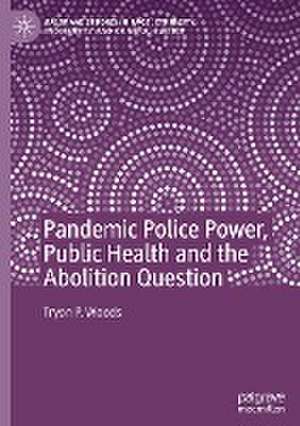Pandemic Police Power, Public Health and the Abolition Question: Palgrave Studies in Race, Ethnicity, Indigeneity and Criminal Justice
Autor Tryon P. Woodsen Limba Engleză Hardback – 18 feb 2022
This book critically explores how police power manifested beyond criminal law into the field of public health during the pandemic. Whilst people were engaged with anti-police violence protests, particularly in the US, they were being policed openly and notoriously by the government and medical science in the public health arena. The book explores how public health policing might be an abuse of constitutional power and encourages the abolition question to be applied consistently to the state’s discourse in the area of public health, as black people the world over continue to bear a disproportionate cost burden for public health policies. The chapters explore contemporary policing in terms of the historical context of slavery, the growth of the police and prison abolition movement and how this should be applied more widely, and how police power operates throughout society beyond the criminal justice system, in finance, technology, housing, education, and inmedicine and health science. It seeks to re-examine our relationship to health sovereignty and the police power more fundamentally. It provides insights into the convergence of policing and social control of humans and argues that the most normative response is abolition.
| Toate formatele și edițiile | Preț | Express |
|---|---|---|
| Paperback (1) | 639.25 lei 6-8 săpt. | |
| Springer International Publishing – 19 feb 2023 | 639.25 lei 6-8 săpt. | |
| Hardback (1) | 643.34 lei 6-8 săpt. | |
| Springer International Publishing – 18 feb 2022 | 643.34 lei 6-8 săpt. |
Preț: 643.34 lei
Preț vechi: 756.86 lei
-15% Nou
Puncte Express: 965
Preț estimativ în valută:
123.12€ • 128.37$ • 102.32£
123.12€ • 128.37$ • 102.32£
Carte tipărită la comandă
Livrare economică 21 martie-04 aprilie
Preluare comenzi: 021 569.72.76
Specificații
ISBN-13: 9783030930301
ISBN-10: 3030930300
Pagini: 277
Ilustrații: XIII, 277 p. 1 illus.
Dimensiuni: 148 x 210 mm
Greutate: 0.5 kg
Ediția:1st ed. 2022
Editura: Springer International Publishing
Colecția Palgrave Macmillan
Seria Palgrave Studies in Race, Ethnicity, Indigeneity and Criminal Justice
Locul publicării:Cham, Switzerland
ISBN-10: 3030930300
Pagini: 277
Ilustrații: XIII, 277 p. 1 illus.
Dimensiuni: 148 x 210 mm
Greutate: 0.5 kg
Ediția:1st ed. 2022
Editura: Springer International Publishing
Colecția Palgrave Macmillan
Seria Palgrave Studies in Race, Ethnicity, Indigeneity and Criminal Justice
Locul publicării:Cham, Switzerland
Cuprins
Chapter 1: - Reconceptualizing How Policing Works.- Chapter 2: - Reform, Violence, Capital, and Prison Abolition.- Chapter 3: -The Police Power of Finance, Technology, Housing, and Education.- Chapter 4: -Evaluating COVID-19 Testing, Infection, Mortality, Treatment, and Vaccines.- Chapter 5: -Efficacy, Eugenics, and Law in the Modern Vaccine Regime.- Chapter 6: -Black Life-Matters, Medical Racism, and Health Self-Determination.
Notă biografică
Tryon P. Woods is Associate Professor of Crime and Justice Studies at the University of Massachusetts, USA, and Special Lecturer in Black Studies at Providence College, USA. Dr. Woods has worked with community-based organizations in New York City, Seattle, and Oakland on HIV/AIDS prevention, supportive housing for drug users, and police accountability. He is the author of Blackhood Against the Police Power: Punishment and Disavowal in the “Post-Racial” Era (Michigan State 2019); co-author of the forthcoming Ex Aqua in the Mediterranean: Excavating Black Power in the Migrant Question (Manchester UP); and co-editor of Conceptual Aphasia in Black: Displacing Racial Formation (Lexington 2016) and On Marronage: Ethical Confrontations with Antiblackness (Africa World Press, 2015).
Textul de pe ultima copertă
This book critically explores how police power manifested beyond criminal law into the field of public health during the pandemic. Whilst people were engaged with anti-police violence protests, particularly in the US, they were being policed openly and notoriously by the government and medical science in the public health arena. The book explores how public health policing might be an abuse of constitutional power and encourages the abolition question to be applied consistently to the state’s discourse in the area of public health, as black people the world over continue to bear a disproportionate cost burden for public health policies. The chapters explore contemporary policing in terms of the historical context of slavery, the growth of the police and prison abolition movement and how this should be applied more widely, and how police power operates throughout society beyond the criminal justice system, in finance, technology, housing, education, and in medicine and health science. It seeks to re-examine our relationship to health sovereignty and the police power more fundamentally. It provides insights into the convergence of policing and social control of humans and argues that the most normative response is abolition.Tryon P. Woods is Associate Professor of Crime and Justice Studies at the University of Massachusetts, USA, and Special Lecturer in Black Studies at Providence College, USA. Dr. Woods has worked with community-based organizations in New York City, Seattle, and Oakland on HIV/AIDS prevention, supportive housing for drug users, and police accountability. He is the author of Blackhood Against the Police Power: Punishment and Disavowal in the “Post-Racial” Era (Michigan State 2019); co-author of the forthcoming Ex Aqua in the Mediterranean: Excavating Black Power in the Migrant Question (Manchester UP); and co-editor of Conceptual Aphasia in Black: Displacing Racial Formation (Lexington 2016) and On Marronage: Ethical Confrontations withAntiblackness (Africa World Press, 2015).
Caracteristici
Centres anti-blackness to understand police power, public health and inequality Argues that policing health and social issues deserve a much deeper debate Contributes to scholarship on black social movements and existential thought







